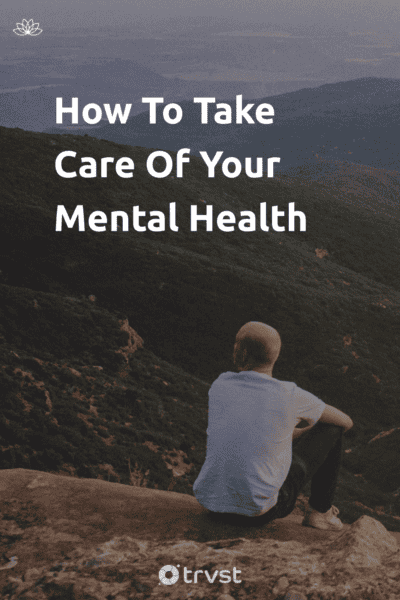How To Take Care Of Your Mental Health
Mental health refers to our emotional, psychological, and social well-being. It plays a tremendous role in our thoughts, speech, and emotions. It is crucial at every stage of life, from childhood to adulthood. Given its importance, this article discusses practical ways how to take care of your mental health.
Related Read: Mental Health Language Guide, Mental Health Quotes.
Self-care: Importance of caring for your mental health

You need to practice self-care diligently to maintain good mental health because your mental health determines how you relate with other people, handle stress, and make choices. It also determines how you think, act, and feel.
Taking care of your mental health includes your emotional, psychological, and social well-being. It helps you manage stress better, improve your physical health, and increase your energy levels when you spend time on small acts that enhance your mental health.
A healthy state of mind means you can be more productive, maintain good relationships, adapt to thriving changes in your life, and cope with life’s problems efficiently. Self-care for mental health maintenance is essential for people with one mental illness or the other. Self-care will help you lead a healthy life.
11 Ways To Take Care Of Your Mental Health
1. Participate in activities you enjoy.

Participating in the activities that make you happy can go a long way in improving your emotional well-being and mental health. These activities could be cooking, painting, playing a musical instrument, or solving puzzles.
Your happiness means a lot more than you realize. It’s a crucial part of your life that affects every other part. Your happiness can increase your motivation and productivity. So, indulge in life’s simple pleasures to maintain good mental health.
2. Practice gratitude.
Practicing gratitude is a crucial aspect of self-care. Be grateful for the little things that make you happy. Keep a gratitude journal. Journal daily about the things you are thankful for after you wake up and before you go to bed.
Doing this will remind you of the good parts of life. It will keep you going through the difficult times. Also, it will help you focus and reconnect with yourself. It only takes a few minutes to journal. Be specific. To help you get started, check out our list of 110 journal prompts.
3. Practice more optimism.

Optimism is a positive attitude towards the future. It is a mental attitude of hope and confidence that the coming days will be better and more successful. As an optimistic person, you expect things to work out for the best. You believe that good things can come from sad events.
Practicing optimism can reduce your anxiety and depression. As an optimistic person, you take control of the situation instead of allowing it to overwhelm you. It helps you manage stress better.
Being optimistic can also improve your cognitive focus and problem-solving ability. Also, optimism can improve your ability to build and maintain relationships.
4. Talk to people you trust.
It is ideal for opening up to at least one family member or friend about the state of your mental health and your feelings, especially when experiencing constant negative thoughts.
People with mental illnesses like bipolar disorder, post-traumatic stress disorder, anxiety disorder, psychosis, and OCD experience harmful intrusive thoughts often. Expressing what’s going on in your mind can help improve your mental health conditions.
Surround yourself with support systems. Talking to other people can also help you stay connected to other people instead of removing yourself from their lives during bad days.
5. Regular exercise promotes physical and emotional health.

Your mental health condition often reflects on your physical body. Luckily, working out can improve your mental health and overall well-being. Exercise also improves focus and prevents heart disease.
Research shows that aerobic exercises like jogging, cycling, walking, dancing, and gardening reduce anxiety and depression by increasing blood circulation to the brain. It also influences the region of the brain that controls motivation and moods.
Exercising is an efficient distraction from intrusive thoughts. Working out improves your body image, further improving your self-confidence. It releases endorphins that make you feel good about yourself. With excellent self-esteem, you can build healthy relationships with people.
Other benefits of exercising include getting enough sleep, increased energy levels and stamina, and improved physical health. Experts recommend working out moderately for an average4 of 2-5 to 5 hours weekly.
6. Learn new skills.

You can learn new skills to take care of your mental health. Learning to do something you couldn’t do before can boost your confidence and help you build a sense of purpose. It can increase your productivity and boost your career, although you don’t have to learn skills related to your professional career.
Learn because you want to enjoy it and have fun. Some skills to learn are cooking a new dish, blog writing, painting, knitting, or learning to be more DIY-inclined. You can also learn practical skills like plumbing or presentation skills. You could sign up at a college and learn a course that interests you. Or you can also learn a new language.
7. Practice mindfulness.
Mindfulness is the act of paying more attention to the present. It requires you to pay attention to what is happening in your mind and around you. You observe your thoughts, feelings, and body sensations. Practicing mindfulness means you're not excessively focusing your attention on past events or planning the future.
Adding breathing exercises to your daily routine is one of the healthy ways to take care of your mental health. Being mindful allows you to experience your life from a new perspective. It helps you manage stress, anxiety, and depression.
You will learn how to appreciate the little things in life. Another way to incorporate mindfulness into your daily routines is by practicing yoga. It aids muscle relaxation, and you are assured a good night's sleep. Also, mindfulness can help build healthy relationships and stay connected to your loved ones3.
Related Read: Mindfulness Journal Prompts, Mindfulness Podcasts.
8. Connect with nature.

Nature is an essential part of our existence. Unfortunately, urbanization is reducing the amount of nature we have around us. For this reason, make an extra effort to be around nature.
Nature refers to spaces like parks, forests, beaches, rivers, and canals. It could also be a private garden, trees and grass shrubs on the streets, and indoor plants. Being around nature can improve mental health conditions.
It reduces stress and anxiety and improves your physical health5. It provides peer support and connects you to your local community. Go on walks in parks and gardens. Breathe in the earthy scent of nature and listen to the sounds of nature.
You can also bring nature to yourself by nurturing houseplants, vegetables, or flowers. You can participate in bird watching from the comfort of your home by fixing a bird feeder in your backyard to attract birds.
Related Read: Ways to Connect With Nature.
9. Eat adequately.

Our diet plays a tremendous role in our overall health. Research conducted in China shows that dietary patterns may increase the occurrence of depression. Another study conducted on 120 children shows that the consumption of fast food, sugar, and soft drinks may increase the risk of ADHD.
Children who eat little to no vegetables, fruits, and fatty acids have a higher chance of developing ADHD symptoms. Tests conducted on depressed adults show that eating healthy improves mental health2.
You need to include more nutrient-rich foods in your diet to eat healthy. Your blood sugar level drops when you don't eat healthy regularly. When your blood sugar drops, you can feel irritated, angry, tired, or depressed.
Also, remember that hydration is imperative to your overall health. Stay hydrated. Drink water, smoothies, juices, coffee, or tea. Drink more water than other beverages. Increase the protein, fruit, vegetable, and fat content in meals.
You need complex carbohydrates in sweet potatoes, brown rice, and starchy vegetables because they boost serotonin levels. Avoid drinking caffeine so you can get enough sleep. Improve your relationship with food in general. Your mental health will thank you for it.
10. Reduce your screen and social media time.
Screen time refers to the hours and minutes we spend staring at our phones, tablets, laptops, and computers. Excessive screen time affects mental health. For instance, we don't connect with nature as we should because we constantly switch from one app to another.
Most adult screen time usage peaked during the COVID-19 pandemic when the world transitioned to working from home. Research shows that young people with excessive screen time will experience anxiety1, somatic complaints, and depression.
The blue light exposure from your screen is harmful to your health. It can damage your eyes and throw your body's biological clockwork into disarray. Not getting enough sleep can affect your mental health negatively. So, reduce your daily screen time, especially a few hours before going to bed. You're guaranteed to fall asleep fast and get quality sleep.
Read more: The Digital Detox Challenge.
11. Talk to a professional about your mental health condition.

It's okay to seek professional help when you're experiencing overwhelming stress and symptoms of mental illness. Call your therapist, counselor, or your local mental health helpline. You can get emotional support when negative feelings and mental health symptoms become too much to handle.
When to seek a mental health professional
Your mental health condition doesn't have to be severe before you seek professional help. If you are feeling sad, down, or numb for extended periods without a specific reason, you should see a professional.
You should also seek professional help if you have concerns like:
- Rapid mood swings from high to low, deep sadness.
- Apathetic feelings toward life
- Frequent and sudden bursts of anger, hostility, and violence
- Suicidal thoughts and behaviors
- Frequent dissociation periods
- Withdrawal from activities you once enjoyed or avoiding friends and family members
- Addictive behaviors like excessive drinking, gambling, abusing drugs, and errant sexual behaviors
- Experiencing hallucinations and sensory experiences that feel real but are not real
- Inability to cope with your daily life
- Experiencing traumatic event
- Mysterious physical health problems with no known cause
- Insomnia and Hypersomnia- when you sleep too little or too much
Conclusions: How To Take Care Of Your Mental Health
Create a mental health plan after reading this article. These small acts of care and maintenance, like a relaxing activity or seeking treatment from a mental health professional, can make a huge difference. Please don't be ashamed to seek help whenever you need it. There are mental health services that can provide support.
Remember to share it with others! Let’s take care of our and other people’s mental health.
| 1 |
Gardner, C. (2023). Study Probes Connection Between Excessive Screen Media Activity and Mental Health Problems in Youth. Yale School of Medicine. |
| 2 |
Clay, R. A. (2017). The Link Between Food and Mental Health. |
| 3 |
Davis, D. M., & Hayes, J. A. (2012). What Are the Benefits of Mindfulness? |
| 4 |
Sharma, A., Madaan, V., & Petty, F. D. (2006). Exercise for Mental Health. PubMed Central (PMC). |
| 5 |
Weir, K. (2020). Nurtured by Nature. |
Jen’s a passionate environmentalist and sustainability expert. With a science degree from Babcock University Jen loves applying her research skills to craft editorial that connects with our global changemaker and readership audiences centered around topics including zero waste, sustainability, climate change, and biodiversity.
Elsewhere Jen’s interests include the role that future technology and data have in helping us solve some of the planet’s biggest challenges.
Fact Checked By:
Isabela Sedano, BEng.

